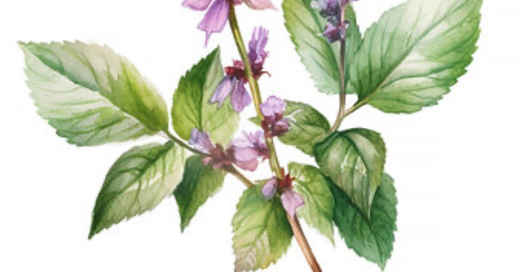On a family vacation not long ago, my younger brother and I were standing at the resort bar waiting for our mojitos when he leaned over and sniffed me.
“Are you” — he dropped his head closer — “wearing” — his upper lip curled incredulously — “fucking patchouli?!”
I winced. I don’t like it when my brother disapproves of me. He may be a year and half younger, but he is a doctor, which makes him the more respectable sibling. I, as a writer and general all-around weirdo, have clearly made questionable life choices. Now including my personal bouquet.
“Ew. You know, most people outgrow that, right?” he said, grabbing his cocktail and taking a big step away from me.
The truth is that I’ve worn patchouli for most of my life, though due to spending most of our adulthoods on opposite sides of the country my brother apparently avoided this fun fact until we were perspiring together under the Mexican sun.
Now he was giving me a look very much like our father’s when I got caught drinking the Hiram Walker creme de menthe out of the liquor cabinet when I was 12—disappointed and deeply perplexed at my horrible taste.
I’m well aware of patchouli’s pungency. It’s not like I lather myself in it. As part of my aprés shower ablutions for decades I have applied the teeniest dab of pure patchouli oil just below my sternum, a spot only frequented by my husband, and on nights when I fall asleep on the sofa, the dog. I have been through exactly three tiny bottles of the stuff in 25 years.
I like it. To me it smells sexy yet wholesome, like frolicking in the forest wearing nothing but a tiara of flowers and cozy cotton undies that cover the whole cheek.
It also has the valuable advantage of repelling the hellacious sand gnats of the South, making any outdoor romp much more enjoyable, half-nekkid or not.
Many people do not share my aromatic affinity. But it’s not true nobody else does.
For real, you’d be hard-pressed to find a fragrance more polarizing than patchouli. You either love it, or a single whiff sends you into a tizzy that borders on derangement.
I have heard the haters describe the scent as “eau de rotting corpse,” and “mildewed monkey armpit;” by far my favorite is “Bilbo Baggins’ feet after hiking the Sierras.”
I get it. I have the same reaction to every mens’ cologne ever made.
But I’ve always been curious why it evokes from someone like my brother—who really is a nice man when he’s not giving me shit—such a recoiling response.
For a while I wondered if it was perhaps genetic, like how some people have a variant in one of the olfactory receptors that makes cilantro taste like soap. (I feel terribly sorry for those with this unfortunate defect; you’re missing out on some major culinary depth.)
There’s no scientific evidence of hereditary abhorrence for patchouli, though history may have imprinted certain associations on our ancestors, for better or worse.
This bushy cousin of the mint family—aka pogostemon cablin—is native to the jungly tropics of Southeast Asia, where several thousand years ago the Tamil people first named it and put its medicinal and aromatic properties to widespread use.
Its efficacy as an insect repellant, antibiotic, and alleviator of everything from colds to cancer put it on the global radar, its distillations traded along the Silk Road to the Middle East along with other soon-to-be ubiquitous products like cinnamon and opium.
King Tut was buried with ten gallons of it, and its applications endured as a staple of the ruling Roman Empire. In 2023, a team of archaeologists unearthed an exquisite little quartz vessel in the ancient ruins of Carmona, still perfectly sealed. Inside was a patchouli-scented ointment more than two thousand years old, the fine casing implying that the contents were highly valuable. (At least to somebody; maybe their brother thought they stank, too.)
The legend of its migration to 18th-century Europe involves nobody’s favorite short king Napoleon, who brought Empress Josephine a luxurious cashmere scarf from Egypt preserved in patchouli leaves to keep the pests away. These Kashmiri scarves became all the rage amongst the wealthy women of the day, the exotic, woodsy smell associated with opulence and elegance. (For my textile nerds, this fascinating piece tracks the intertwined history of cashmere accouterments and patchouli.)
By the 1830s, French perfumiers had discovered that patchouli’s unique chemical properties help “fix” other scents to make them last longer, making it the perfect base note for some of the most popular perfumes in the world. (Not the jitterbug kind, though mad respect to the beet of Tom Robbins, may his memory be a blessing.)
Also around this time, undertakers discovered patchouli’s power to outrank even the most rancid states of decomposition and included it in many a funeral procession, which marked the beginning of its unfavorable reputation.
The affiliation with death—allegorical or otherwise—followed it all the way to the 1960s, when acolytes of the Grateful Dead adopted it as their signature scent, influenced by its Far Eastern origins that promised enlightenment. It was applied liberally to signify spiritual advancement as well as to cover up the odor of weed, which anyone who has burned incense in a dorm room while listening to “Bertha” knows it does not.
It's now thought that patchouli’s strength as a fixative actually has the lamentable effect of amplifying body odor, and its infamy was not helped by the poor hygiene exercised by certain Deadheads and their ilk. The stinky stereotype permeated the culture and endures today, however unjustly.
Come on, even if a person once rode 14 hours in the backseat of a VW Scirocco to catch the ‘92 Oakland shows, it’s not really fair to vilify her as a dirty hippie when she JUST showered AND used deodorant (aluminum-free, naturally.)
Unlike other dank scents like sandalwood or musk, chemists have never been able to create a synthetic version of patchouli due its complex molecular make-up. It continues to factor prominently in modern Chinese medicine, and loads of Western-based research studies have been conducted that corroborate many of the ancient claims.
In spite of such virtuous bonafides, patchouli remains quite the social punching bag. It supplies comedians with endless material, and Jon Cusak's famous insult about it sent his nemesis packing in the GenX romcom High Fidelity.
In 1985, Mattel imbued patchouli oil into the plastic used for its villainous action figure Stinkor in the Masters of the Universe line of toys. (Joke’s on them; given its aphrodisiac qualities, She-Ra probably dug it.)
Part of the mockery stems from patchouli’s popularity among the liberal-minded. Since the hippies sealed its fate in the 1960s, patchouli has been the unofficial scent of the counterculture. It’s accompanied the movements of civil rights and environmental justice, an implication of one’s openness to the protection of our natural resources and the progress known as the diversity, equality, and inclusion of all people in American society.
Does that make wearing patchouli a form of virtue signaling? Fuck yeah it does. If you’re offended by how I smell, I’ve got a whole lot more you’re probably not going to like.
But in 2025, I’m astounded at how everything has become a blur very quickly: My precious Grateful Dead co-opted by frat bros and these assholes. Magic mushrooms and MAHA moms. Apparently Ivanka Trump’s insanely-priced cheesy perfume contains notes of patchouli.
I, too, have found myself questioning my assumptions lately. I’m all for keeping regulations on food and medicine, but would it be so bad to get rid of the nasty dyes in them? Elon and his DOGE baby bots deserve nothing but stale bread and impotence for the rest of their lives, but perhaps the government could operate more efficiently?
And while you will never find even the littlest of my Bilbo Baggins toes on the red side of the line, I am increasingly finding the knee jerk nonsense of some on the left exclusionary and frightening.
(Not all: I don’t know what superhero Cory Booker smells like, but I’m imagining a touch of patchouli combined with light wool suit and honest sweat. While I will regretfully miss the Saturday, April 5 Hands Off Mobilization Even in Forsyth Park, I trust that same scent will be well-represented.)
What old age and a touch of grey have taught me is that life—and people—don’t operate within defined edges, and sometimes, we just have to accept without understanding.
Fortunately, my brother and I stand in the same general shade of the political spectrum. (The biggest argument at our Thanksgiving table is playing “Who Would Hide Us?”)
But we agree to disagree about about a lot of things, including childrearing (a weak but well-placed spank once in a while never hurt, imo), cannabis (he tried it in junior high and nearly puked) and which one of us broke the remote control in 1983.
His rebuke about my choice of fragrance hurt my feelings more than our usual sibling rivalries, and it got me thinking about the way we judge people by the way they smell.
Turns out there are lots of feelings about it. I read recently about University of Cambridge English professor Amelia Louks, who wrote her entire doctoral thesis on how bodily scents are represented in modern literature to convey certain aspects about class and social standing. Typical academic stuff, very boring bathroom reading.
But when Dr. Louks posted a photo of herself with the finished manuscript, Olfactory Ethics: The Politics of Smell in Modern and Contemporary Prose, the internet went insane, interpreting it as social science and projecting all of its noxious opinions about body odor, class, and prejudice upon her, forcing her to write a lengthy explanation for those who did not read the actual study, which is everyone. The whole kerfuffle proved that folks definitely moralize based on smell, and also that reading comprehension levels are disturbingly low.
Anyway, everyone these days is entitled to their opinions, informed or not. I realize that people who catch a trace of my own olfactory choice may assume certain things about me, and I’m pretty much OK with that. I’m probably never going reserve judgment that men who wear Paco Rabanne are terrible lays and have less than $10K in their retirement accounts.
I do still crave my little brother’s approval, and I’ve earned plenty of respectability points by publishing a couple of books and spawning a child who is becoming a doctor. But I’m done defending myself on this one.
He’ll just have to accept that I’ll never outgrow patchouli, and he can just stand upwind from me on the next family vacation.
We’re going to Costa Rica. Bet he changes his tune when the gnats show up.
If you get confused, just listen to the music play ~ JLL






I’ve never smelled it on you! You must not wear much. Little brothers can be massive dickheads, especially when they’re the “more respectable” sibling. I’ve been unemployed for decades, and my bro is an attorney 😅
You made me laugh out loud 👏🏽, thank you! I hated patchouli in college and started wearing it later💚